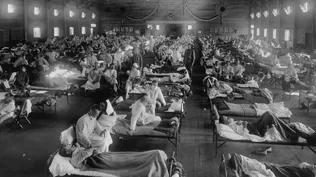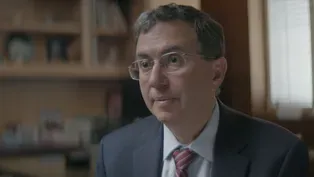
Life Expectancy
Clip: Episode 1 | 2m 5sVideo has Closed Captions
Historians and public health practitioners talk public health's impact on life expectancy.
Historians and public health practitioners talk public health's impact on life expectancy.

Life Expectancy
Clip: Episode 1 | 2m 5sVideo has Closed Captions
Historians and public health practitioners talk public health's impact on life expectancy.
How to Watch The Invisible Shield
The Invisible Shield is available to stream on pbs.org and the free PBS App, available on iPhone, Apple TV, Android TV, Android smartphones, Amazon Fire TV, Amazon Fire Tablet, Roku, Samsung Smart TV, and Vizio.

The Invisible Shield
Explore the discussion guide for The Invisible Shield, a useful tool for extended learning related to the docuseries. The guide pulls out key themes from the show and presents questions that encourage critical thinking, powerful discussion, and expanded understanding regarding public health.Providing Support for PBS.org
Learn Moreabout PBS online sponsorshipOne of the things we have to remember is that, basically until the 1700s, the entire medical profession was probably a net negative in terms of health.
If you were sick in 1650, you were better off not seeing a physician because the physician would be like, 'Oh, you do seem ill.
Here, take some of this deadly poison, Mercury.
Or would you like some leeches?'
Two centuries ago, 30% of children died before they became adults.
A third of your kids were likely to die in childhood.
But it was also hard to live to 80 or 90.
When my grandfather was born in 1900, he was expected to live to 48 years of age, and he actually lived to 84.
So in the last century we gained 30 years of life expectancy.
But only five of those years were due to everything I learned in medical school - all the really intensive, expensive, sick care things that, you know, you want to have when you have that one rare disease.
But 25 of the years that we gained in that last century were due to things that we can only solve collectively.
To me, that is the most impressive thing that we have ever done as a species.
I think public health goes deep into our history as a way of mitigating the risk of living socially.
How do you limit infectious disease and deaths?
It comes down to prevention.
These are ideas that led to a kind of attention to the environment, the water supply, the sewage systems, housing reforms, the creation of sanitation departments.
It wasn't that long ago that you went to work and you might not come home.
Video has Closed Captions
Public health has doubled our life expectancy, but the system is in jeopardy. (30s)
Providing Support for PBS.org
Learn Moreabout PBS online sponsorship












